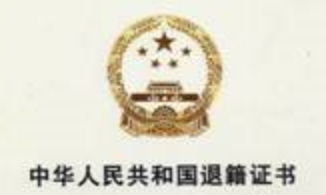A child may automatically acquire dual citizenship in China and another country at birth. For example, a child born in China to a Chinese parent and a U.S. citizen parent may acquire both nationalities. Similarly, a child born in the U.S. to a U.S. citizen parent and a Chinese parent who has not settled in the U.S. may acquire both nationalities.
In some situations, it may be advantageous to renounce Chinese nationality. For example, in some Chinese cities, only foreigners may attend international schools. See generally Choosing Between U.S. and Chinese Citizenship: Pros and Cons.
This article begins with a summary of the rules regarding who automatically acquires Chinese citizenship at birth and then discusses the requirements and procedures for renunciation of Chinese nationality.
Note that in some situations Chinese nationality is lost automatically so there is no need to apply for renunciation. In particular, a Chinese citizen who has settled abroad and has either naturalized abroad or otherwise acquired foreign nationality of his or her own free will automatically loses Chinese nationality, under article 9 of the Nationality Law.
Who Automatically Acquires Chinese Citizenship at Birth?
This table summarizes who is automatically a Chinese citizen at birth according to the Nationality Law:
| Place of Child’s Birth | Citizenship of Parents | Citizenship of Child | Source of Law |
| China | One or both is Chinese | Chinese | Nationality Law, article 4 |
| “ | Both parents are: (a) stateless or uncertain nationality; and (b) have settled (定居) in China. | Chinese | Nationality Law, article 6 |
| “ | Neither is Chinese | Foreign | — |
| Abroad | (a) One or both parents is Chinese and has settled (定居) abroad; and (b) the child has acquired foreign citizenship at birth. | Foreign | Nationality Law, article 5 |
| “ | (a) At least one parent is Chinese; and (b) Either: (1) no Chinese parent has settled abroad; or (2) the child has not acquired foreign citizenship at birth. | Chinese | Nationality Law, article 5 |
Notice that article 4 of the 1980 law abolished the prior “opt-in” rule, under which children of Chinese and foreign marriages within China were allowed to “elect their nationality” after they reached age 18. Ministry of Public Security, Internal Provisions on the Implementation of the Nationality Law (Trial Draft) (关于实施国籍法的内部规定(试行草案)) (Apr. 7, 1981).
Who Can Apply for Renunciation?
The requirements laid down in Articles 10 and 12 of the Nationality Law for renunciation of Chinese nationality are as follows:
Chinese nationals who meet one of the following conditions may renounce Chinese nationality upon approval of their applications:
- they are close relatives of foreign nationals;
- they have settled abroad; or
- they have other legitimate reasons.
“Close relatives” here means parents, husband and wife, children and siblings. Ministry of Public Security, Internal Provisions on the Implementation of the Nationality Law (Trial Draft) (关于实施国籍法的内部规定(试行草案)) (Apr. 7, 1981).
But state functionaries and military personnel on active service shall not renounce Chinese nationality.
Notice that renunciation of PRC citizenship is a “joint enterprise” in the sense that both the individual and the state must consent. See George Ginsburg, The 1980 Nationality Law of the People’s Republic of China, 30 Am. J. Comp. L. 459, 489 (1982).
Renunciation Procedures
Citizenship-related applications should be filed with the city or county’s public security bureau exit-entry administration, according to article 14 of the Nationality Law. Procedures to apply at the Beijing Exit-Entry Administration are here.
According to article 15, there’s also an option to file the renunciation application with a PRC embassy or consulate abroad. The National Immigration Agency confirms this at 申请办理退出中国国籍_办事指南_中国政府网 (www.gov.cn). And the Foreign Ministry has a fee schedule for doing so: 行政事业性收费_中华人民共和国外交部 (fmprc.gov.cn). Nevertheless, as a practical matter, embassies and consulates resist accepting these applications. See Translation: Ministry of Foreign Affairs Press Release, “How Chinese Citizens Should Deal with Nationality Issues” (Apr. 14, 2008).
Applications of Chinese citizens under the age of 18 to renounce citizenship may be filed on their behalf by their parents or other legal representatives.
Upon determining that the application is complete, the local exit-entry administration should issue a receipt. Examination and approval is by the Ministry of Public Security. According to the PSB, this takes 45 business days. But the actual processing time can stretch to one year or more.
If an application for renunciation of Chinese citizenship is approved, you will be issued a certificate of renunciation of Chinese nationality (中华人民共和国退籍证书). You will need to surrender any valid Chinese passport for cancellation.

Now that you are recognized as a foreign national, you will also need to apply for a visa or residence permit. Currently, the Beijing Exit-Entry Administration is only issuing 60-day L visas to a child who has renounced Chinese nationality, meaning that the child will need to travel abroad and apply for a new visa that can be used to apply for a residence permit, such as an an S1 (dependent of foreign worker) or Q1 (family reunion).
Renunciation isn’t necessarily forever. Foreign nationals who once held Chinese nationality may apply for restoration of Chinese nationality if they have legitimate reasons.

Leave a Reply